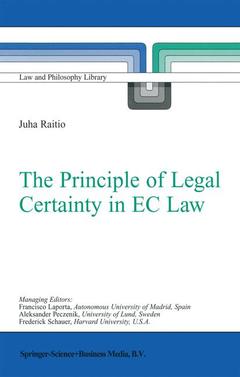Acknowledgements Abbreviations Tables Part 1. EC, History, Integration, EC Law, Legal Certainty 1: Introductory Remarks 1.1 How Can the Principle of Legal Certainty be Studied in the Context of EC Law? 1.1.1 What is ‘EC Law’? 1.1.2 Approaching the ‘EC Law’ from Different Angles 1.2 Ways of Approaching ‘The Principle of Legal Certainty’? 1.3 Objections and Refutations 2: Some Remarks about the History of the European Community 2.1 The Genesis of the European Communities: the ECSC, EEC and Euratom Treaties 2.2 European Integration and the Intergovernmental Tendencies in the 1960s and 1970s 2.3 The Idea of an Internal Market and the Single European Act 2.4 Towards the Era After the Cold War and the Treaty on European Union 2.5 The Treaty of Amsterdam and Beyond 3: Conclusions: Remarks about Theories of Integration, European Community and EC Law 3.1 Theories of European Integration: Nugent’s Summary 3.2 European Community: Siedentop’s View on European Democracy and the European Community 3.2.1 Why Constitutions and the Conception of the State are Important? 3.2.2 The Three Models of State 3.2.3 Creating an Open Political Class and a Rights-based Political Culture in Europe — Mission Impossible 3.3 EC Law: The Jack-in-the-Box Theory of EC Law by Wilhelmsson and Features of the Finnish Discussion Part 2. EC Law, Principles Of EC Law, General Principles, Legal Certainty 4: The Sources, Objectives and Principles of EC Law 4.1 The Sources and Objectives of EC Law 4.1.1 The Relevant Sources of EC Law; Primary Law, Secondary Legislation and Case Law of the European Courts 4.1.2 The Objectives of the European Community 4.2 The Three Categories of the Principles Applied by the European Courts 4.2.1 Principles Derived from theEC Treaty 4.2.1.1 Principles of Loyalty, Proportionality, Nondiscrimination and Equality 4.2.1.2 Principles of Legality, Subsidiarity and Flexibility 4.2.2 General Principles of EC Law 4.2.3 Principles Based on the Case Law of the European Court of Justice 4.2.3.1 The Supremacy of EC Law 4.2.3.2 The Direct Effect and the Direct Applicability of EC Law 4.2.3.3 The Indirect Effect of EC Law and the State Liability 4.3 Problems in the Categorization of Principles and the Literal Approach 5: Legal Certainty in the Framework of Other General Principles of EC Law 5.1 The Term ‘Legal Certainty’ in EC Law and the Intertwining of General Principles — A Literal Point of View 5.2 The Term ‘Rule of Law’, Legality and the Requirements of Democracy 5.2.1 The Terms ‘Rule of Law’ and ‘Legal Certainty’ in the Case Law of the ECJ and CFI 5.2.2 An Attempt to Interpret the Rule of Law 5.3 The Principle of Revocability of Illegal Measures, the Term ‘Déni de Justice’ 5.4 The Good Administration, Right to a Fair Hearing, Misuse of Powers, Proportionality and Openness 5.5 The Concepts of Non Bis In Idem, Lis Pendens and Nulla Poena Sine Lege 5.6 ‘Access to Justice’, the Right to an Effective Judicial Remedy and Legal Professional Privilege 5.7 Examples of the Material General Principles of EC Law 5.8 Fundamental Rights, Human Rights, Equality and the General Principles of EC Law 5.8.1 An Introduction to the History of the Case Law Concerning the Fundamental Rights and Human Rights in EC Law 5.8.2 Discrimination in the Context of Sexual Minorities as an Example of Equality, Non-discrimination and Human Rights in EC Law 6: The Principle of Legal Certainty Based on the Case Law of the European Court of Justice and the Court of First Instance 6.1 The Principle of Non-Retroactivity 6.1.1 The Concept of Retroactivity and the





